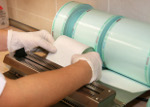Testing for Cancer and Cancer Screening
Author: John Published Under: Health

There are many cases where cancer can be detected prior to developing the symptoms and being physically affected by the diseases. The process of testing for cancer is referred to as cancer screening.
Cancer screening is very important, because when treating cancer, timing is very important. The sooner cancer can be detected and treatment started, the better the chance for an effective treatment.
The type of screening test greatly varies, depending on the type of cancer that is being tested for.
- Breast Cancer: Breast cancer is usually tested for by preforming a mammogram, which is a special type of x-ray of the breast. Mammograms can be very effective at detecting breast cancer early, although breast cancer tests can also be preformed. Those who are at an increased risk for breast cancer, such as when it runs in the family, are recommended to regularly receive mammograms. Otherwise, doctors recommend that women over the age of forty regularly receive mammograms every year or two.
- Cervix Cancer: Pap Smears, or the Pap Test, is usually the best way to check the cervix for cancer. The doctor will scrape cells from the cervix, using a lab to test fir cancer cells or cells that are at risk for causing cancer. This includes checking for the human papillomavirus, which is the biggest risk factor of cervix cancer. Women who are sexually active or over the age of 21 are recommended to regularly have pap tests every three years.
- Colon and Rectum Cancer: There are actually several different tests that are used to screen for colon cancer and cancerous growths, which are called polyps. It is recommended that those over the age of fifty should be regularly tested, although those with risk factors of developing colon cancer should receive testing earlier.
Some of the common tests to detect colon and rectum polyps are:
- Colonoscopy: During a colonoscopy, a doctor will physically examines the colon with a lighted tube that is very long. This lighted tube is called a colon-scope and can also be used to remove polyps.
- Sigmoidoscopy: During a sigmoidoscopy, a doctor will examine the rectum and the lower colon, using a sigmoidoscope, which is a lighted tube. Polyps can often be removed using the igmoidoscope.
- Fecal Occult Blood Test: This is a test that checks for the presences of blood in stool. This is important, because cancer growths and polyps in the colon will often bleed.
- Double-Contrast Barium Enema: During a Double-Contrast Barium Enema, the patient is given an enema that contains barium, as well as having air inserted into the rectum. A number of x-rays are then taken, which have improved quality due to the air and barium enema.
- Digital Rectum Exam: During a digital rectum exam, the doctor will use a finger to manually check for polyps and abnormal areas of the lower colon.
The Effectiveness of Screening for Cancer
There are quite a few tests that are used to detect the cancer., including many that were not mentioned above. However, there has not been enough research, yet, to show whether these are effective at treating or managing cancer.
When to Screen for Cancer
Age is often one of the biggest risk factors of cancer, with those over the age of 65 being most at risk, so many recommend that cancer screening begin after the age of forty, as is the case for preforming regular mammograms. However, there may be other situations where checking for cancer is a good idea.
When considering whether or not to preform a test for cancer, doctors will usually consider the patients history, including family history, to determine if they are at an increased risk of developing cancer. By considering things like their age, lifestyle, and medical history, the doctor can often determine if they are at risk for developing cancer, with those at risk being more likely to be tested.
It is also important to take into account how accurate the cancer screening method is, as well as taking into account the risk of the screening method. This is because recent studies have shown that some tests could actually increase the risk for cancer, as well as being uncomfortable for the patient.
Speaking with a doctor is important, as they can provide their opinion of whether to preform a cancer screening or not.